Editor’s note: The following is extracted from The Sky Is My Witness, by Capt. Thomas Moore, Jr., U.S.M.C.R. (published 1943).
“… Enemy carriers at ten o’clock. Attack enemy carriers!”
There they were! There were two and they were big. They left wakes that were two thin white lines upon the sea…. These two big bastards—this was the enemy!
The sound of our engines, the booming within me—it was like a big bass drum beating like hell under my shirt.
“… Enemy aircraft!… Enemy aircraft!—”
Suddenly, off to the left appeared a score of trim little airplanes, buzzing mosquito-like toward our formation. On their short stubby wings was marked an oversized red ball. Japs—Zero fighters—was all that registered as I saw them roll and twist against the sky and the sun. At first they looked almost playful; then they came down upon us. Quickly they grew from mosquitoes to sparrows, from sparrows to hawks, and, as their distance from us closed to no distance at all, they became warplanes firing a hundred lines of gray-white tracers that webbed in the air.
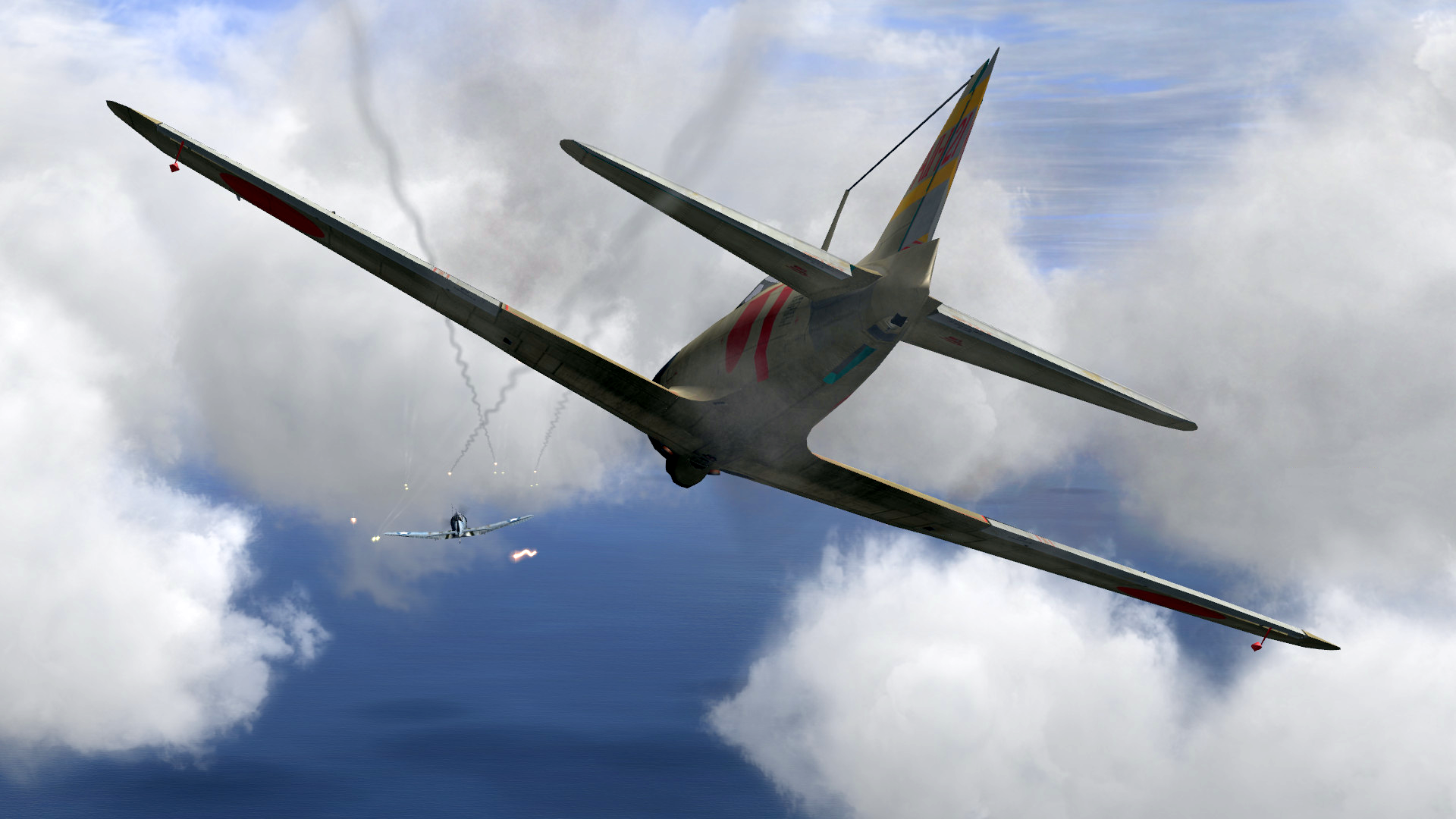
Now, above the sound of engines, I could hear the brittle rattle of machine guns. I saw them swoop down on friends flying near me. I saw my friends respond to the attack valiantly, hopelessly. They fired fast at the faster moving Zeros. Burst after burst of gunfire raced from friend to Zero, from Zero to friend. A Jap Zero veered and turned a hundred feet from me, pilot and motor dead. I heard the thin whine of the wind as it passed over his wings. A helmeted head lolled from side to side as the plane wobbled out of control. Then like a struck match he burst into flame and fell burning into the sea.
Still they came on. Two of them roared up behind us. Little holes were racing across our right wing. Bullets whipped into the instrument panel before me, shattering glass in all directions, shattering the radio equipment. My first and only reaction to this was, “God, here comes part of the Sixth Avenue El!” Huber opened fire. I heard the sharp bark of our gun throwing bullet after bullet at the Japs. It was a good sound, a comforting sound. Already one of them had turned away. The other was still behind us. Huber would get him…. All at once our gun stopped firing.
“My gun is jammed!” Huber yelled through the phones.
I was in no mood for this news. “For God’s sake,” I shouted back, “if you can’t shoot the damn gun at least aim it at him! Make him think it’s good! Scare him with it!”
I am not proud of that command, but there was nothing else to do. A bullet rang off the steel armored plate behind me. To hell with that sonofabitch! The sound of gunfire was now part of me. Its impression had been made and noted. I saw a friend ride into a blast of bullets that went in one side and passed out the other. I saw that friend begin to fall. A long trail of oily black smoke was bursting from beneath his engine like a rib bon unwinding from the tumbling plane.
Already many of the squadron had gone down upon the carriers. I was awaiting my turn. Though they could knock some of us to hell, they couldn’t break our formation. We would dive only when ready or only – when dead.
Again and again and again the bastards came down, zooming under us, over us. Sometimes they passed Huber and me with only six or eight feet clearance, their machine guns giggling. Several bullets tore in and out of the fuselage—
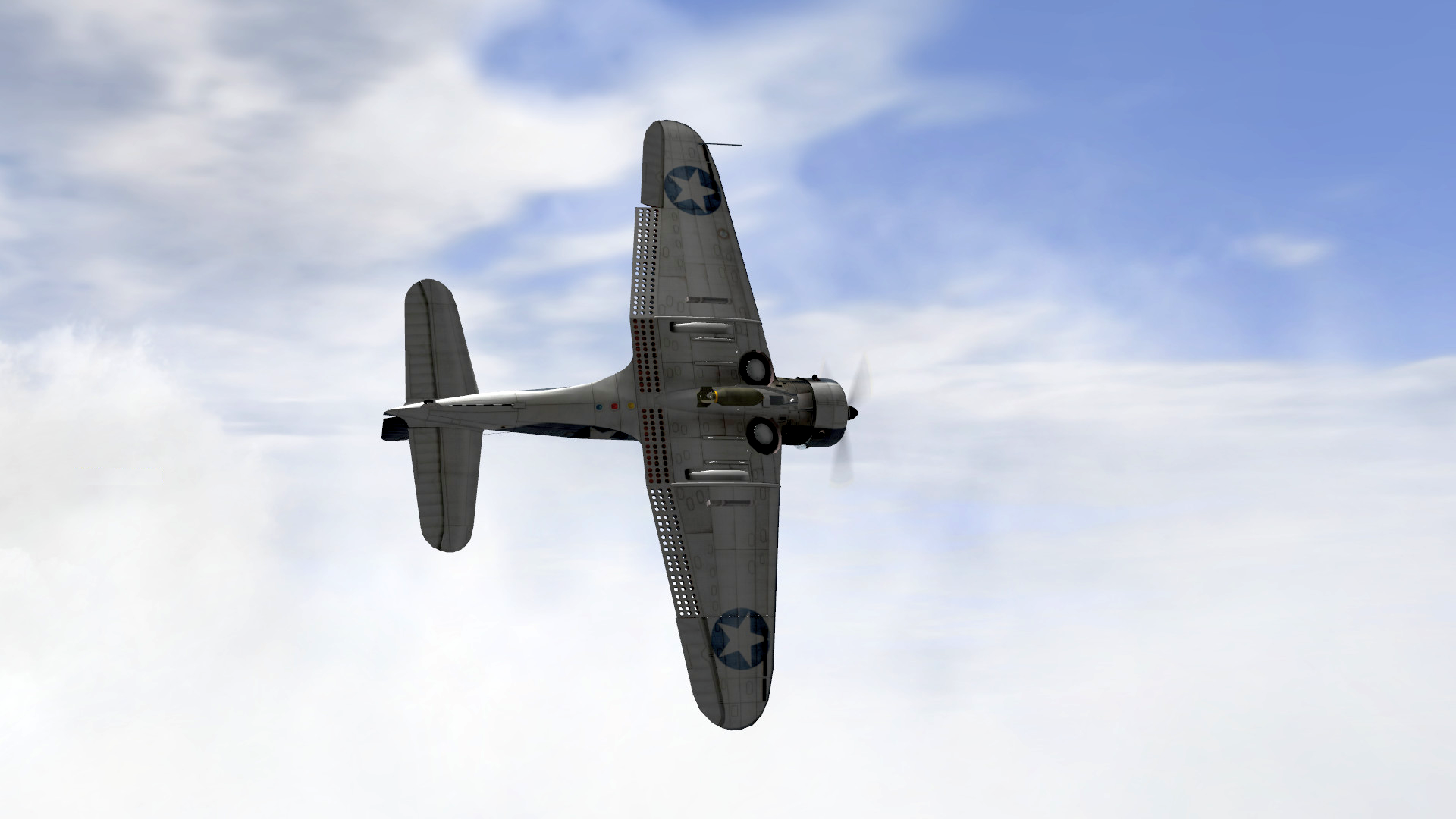
Then I saw Blaine go into his dive. Now it was my turn! I kicked left—left rudder, left aileron—stick forward. We began to dive. Damn it all to hell, here we come!
Everything I had ever been taught about flying or bombing was cut so deep in me I never needed to think or remember. This was it! This was a live run! A real, live run! The bomb was armed; I checked it again and again. We were diving fast—as fast as three tons of dead weight tied to a thousand racing horses could dive. It was a sleigh ride, a damn bellywopping sleigh ride.
Down, down, down from eight thousand feet to the enemy. Below, a thick cloud bank was racing upward to meet us. In a second we were inside it, feeling its dampness, its coolness. Then, another second, and we were free of it.
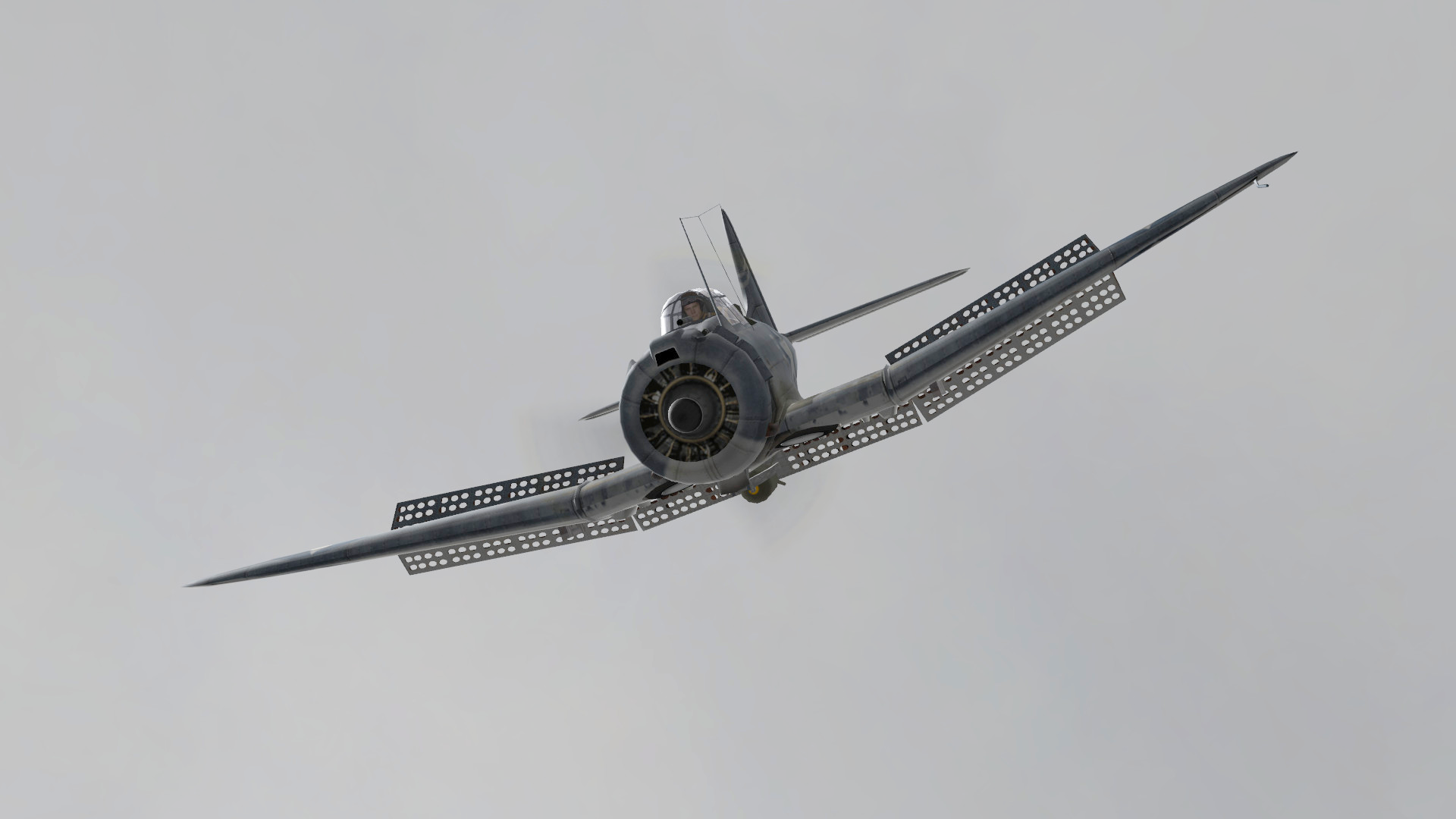
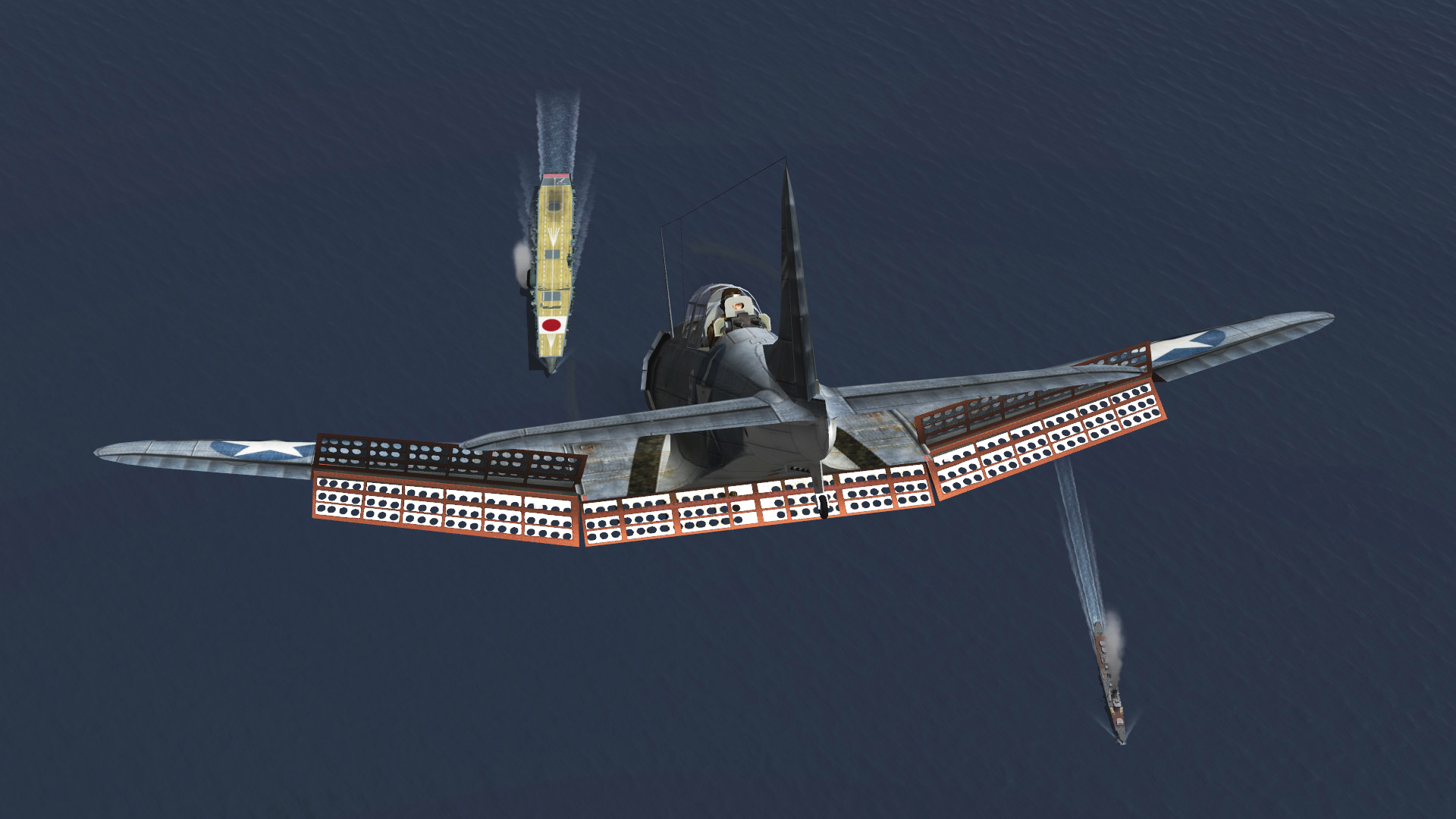
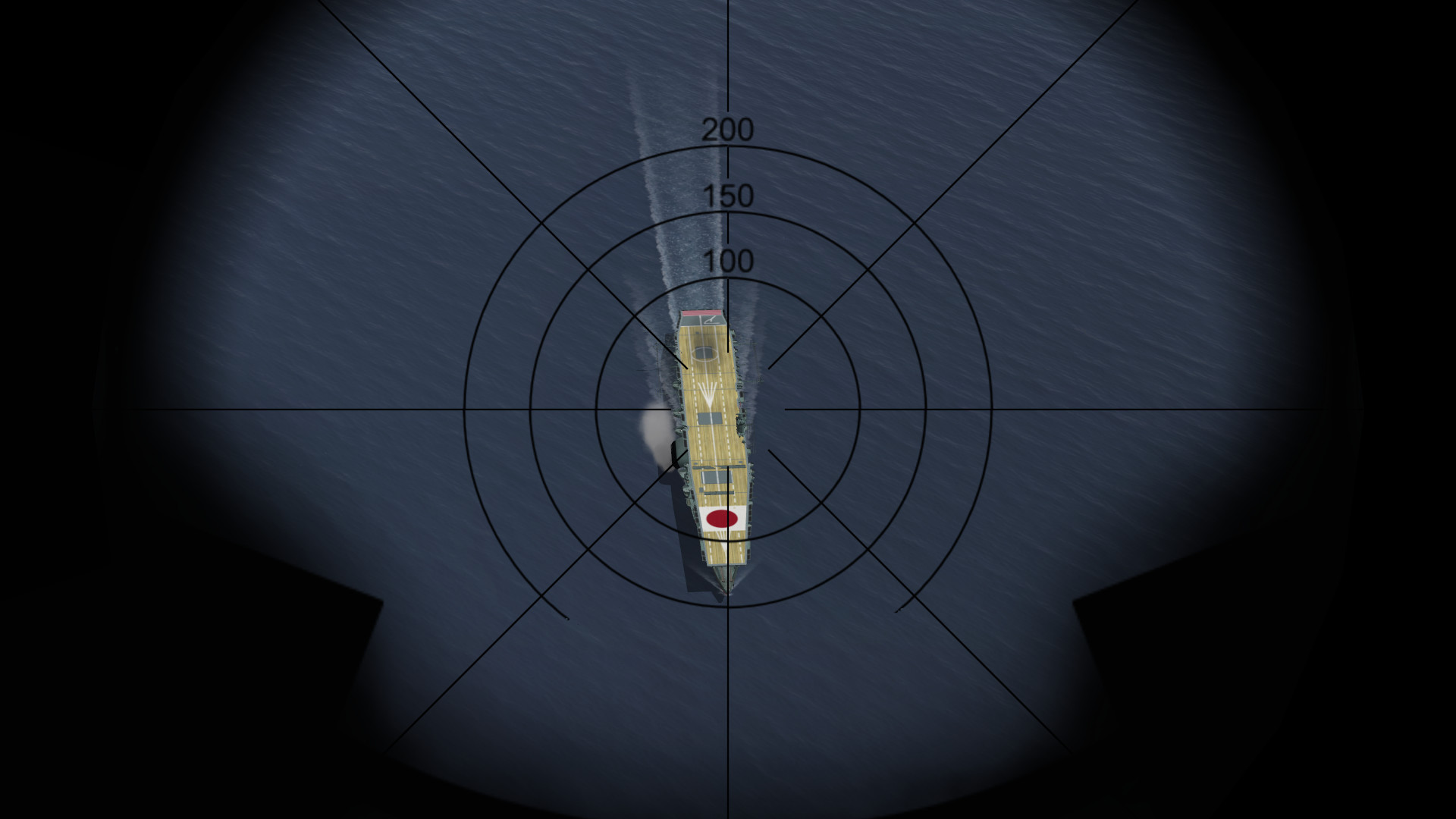
There was the water. And up and down inside my sights was a carrier, a rectangular piece of enemy! We were dead upon it. No need to change direction; the cross-hairs divided it evenly. I checked my bomb again. It was growing bigger and bigger, filling the sights, filling them and now overlapping them. The wind was whining and shrieking in an unending high G.
Pull out! Pull out! A voice was shouting through to me. Drop the bomb and pull out!
I snapped back, glanced at the dials on the instrument panel. The needles were spinning crazily. The altimeter read five hundred feet and we still were diving straight on the target!
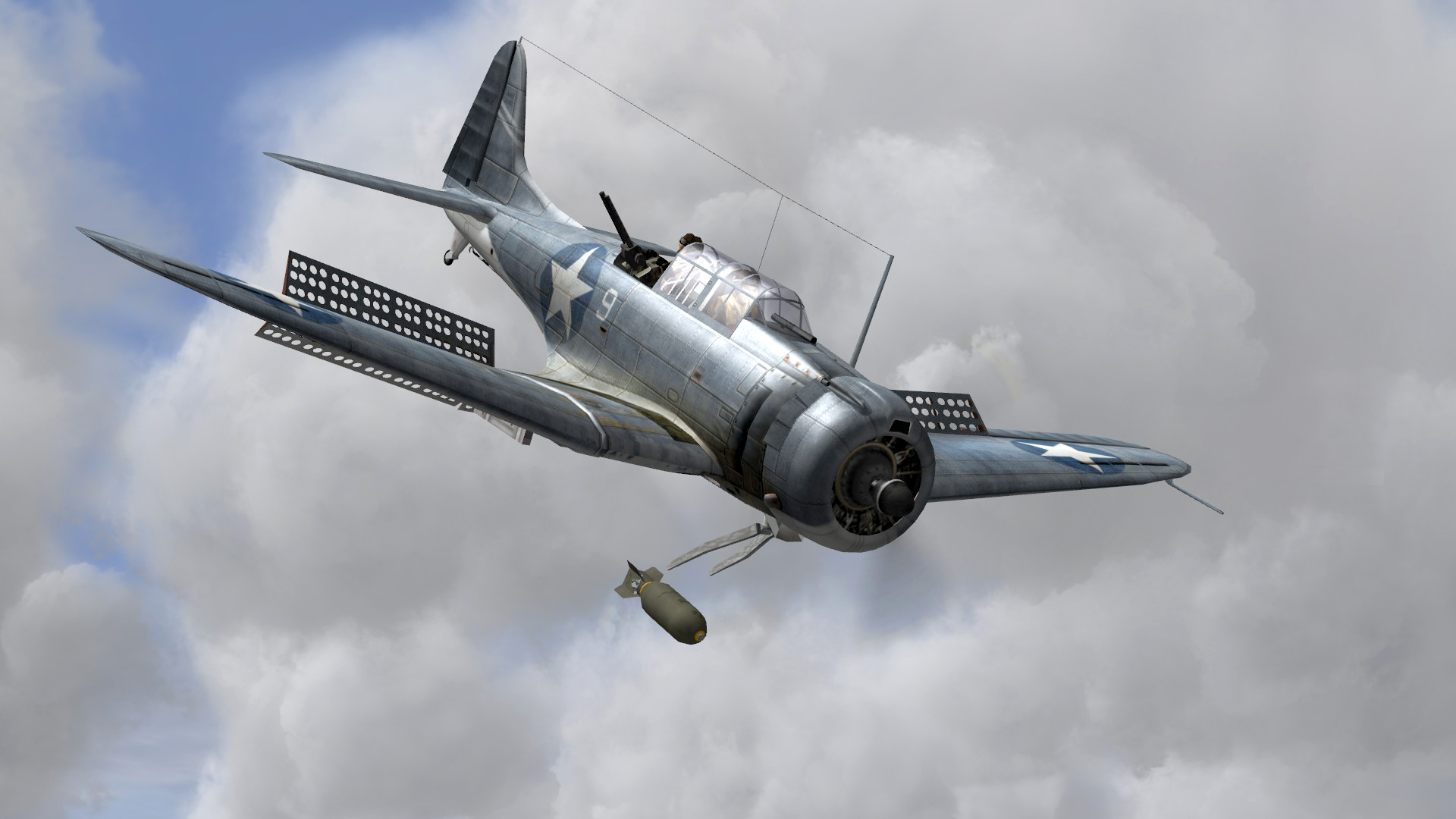
At four hundred feet I punched the bomb release and pulled the stick toward my stomach. The bomb fell clear. I never heard the explosion, but a wave of concussion smashed back at us, and we were thrown completely out of control.
For about five endless seconds I fought the drafts that gripped and tossed us down toward the sea. We dropped, climbed, and dropped again as the propeller spun and screamed. We were losing altitude— The water was less than forty short feet below—
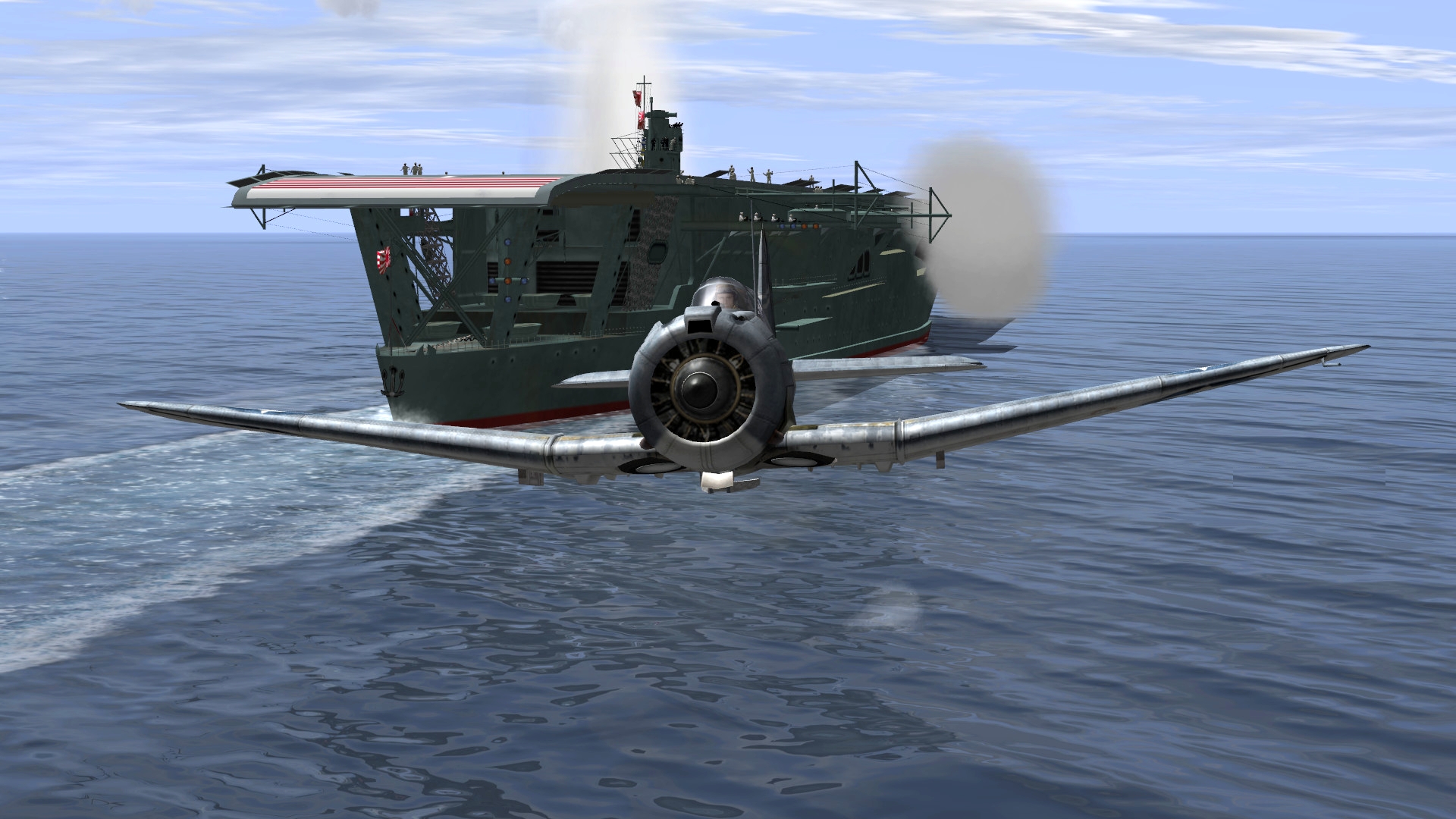
Then, abruptly, we were free and clear again. Only twenty-five feet above the water, the airplane recovered its balance and motion. We began to skim the waves, gaining speed to regain altitude.
I looked back to see what damage our bomb had done to the carrier, and the view was suddenly blocked by the sight of three Jap fighters bearing down upon Huber and me—hell bent for destruction!
Futilely I pushed the throttle to its last advance notch, and the speed indicator needle began to climb to higher numbers; but the highest number on the dial was not high enough, not with the altimeter registering dangerously close to zero.
The Japs came on. Somewhere off in the sky ahead was a cloud bank, a refuge if I could reach it. But we would never make it in time; I knew we were going to get it and get it good. Still, it was a life ring, and I made my grab for it. . .
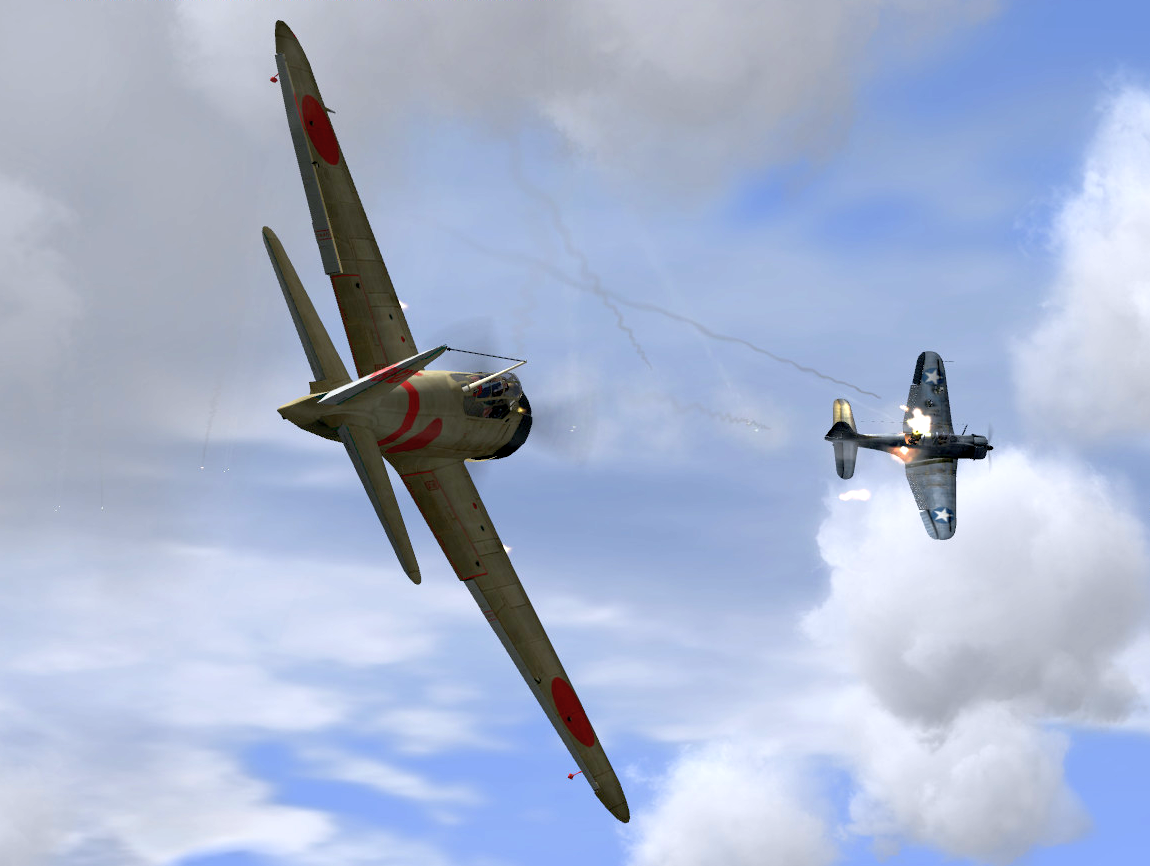
I heard the bastards warm their guns with a few short bursts of fire; they were estimating the range. I knew Huber was still positioning his gun. He was in a bad spot. He was helpless. Their guns began to rattle a jumbled tac-tac-tac-tac-tac-tac-tac-tac…. Their many guns against—what? Against a nineteen-year-old kid behind a useless weapon. Tracers streaked by us on all sides. “–— ’em! –— ’em!” I heard myself cry out a dozen times. The sound of their machine guns sounded above everything else, a sharp, angry noise. One of them was firing a long, long burst.
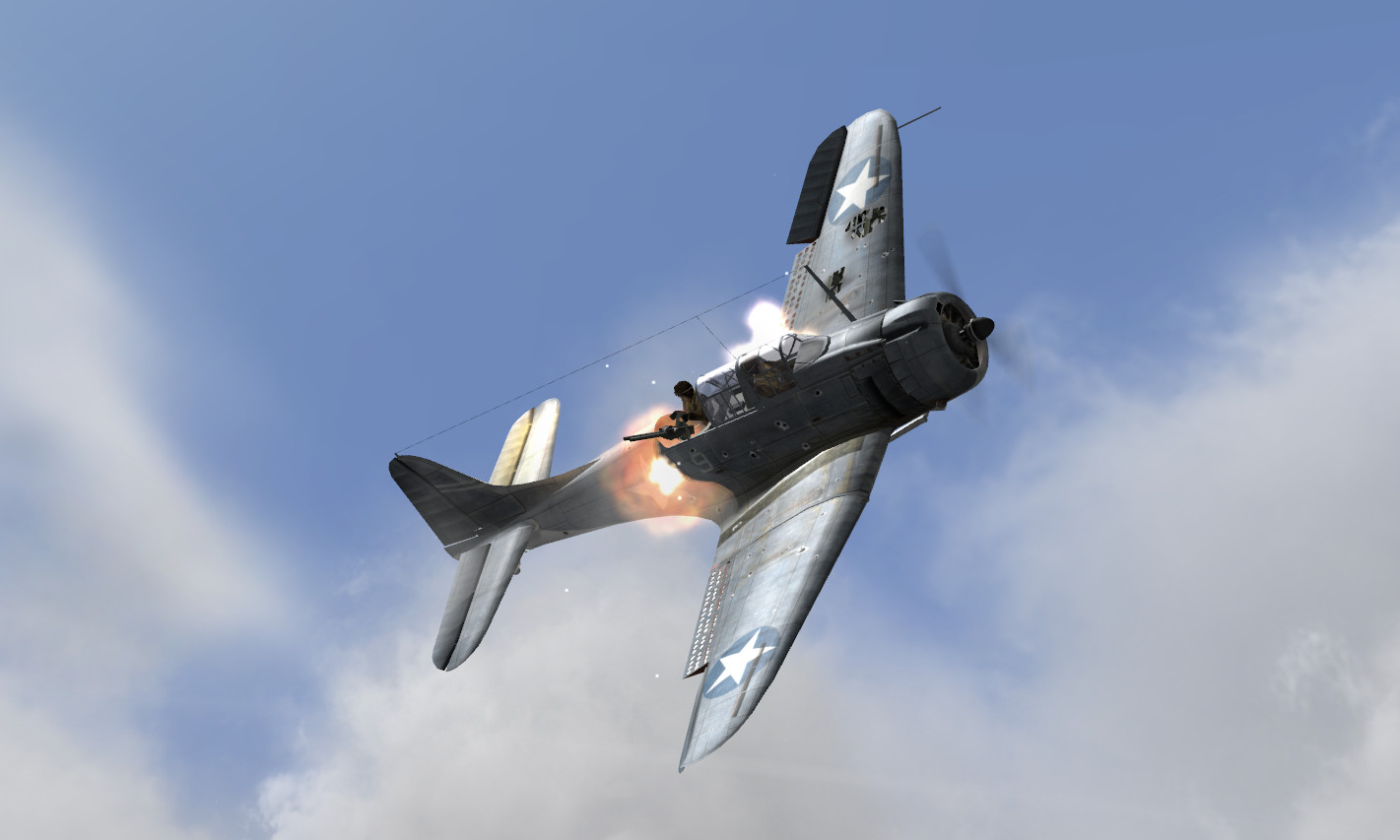
“I’M HIT!” Huber screamed. “I can’t aim the gun anymore . . .”
Hang on! Hang on! The cloud was closer now. I looked back at Huber. God! His face and chest were covered with splashes of blood. I thought he would soon die, and only two hours before—
Another burst, and another, and another. The bullets were close and deadly. They rang alarms as they struck all parts of the ship. The motor began to cough. It coughed four or five times and stopped. The propeller was turning in slower and slower circles. We started to nose down; I had to prepare for a water landing. The fuel line must be shot away. I switched tanks and grabbed for the wobble pump. I almost broke my hand reaching. From his rear seat Huber, wounded as he was, was already working it. The gasoline from the auxiliary tank was pressured to the engine. The motor coughed and caught; the propeller was spinning again. We were still flying!
Behind us the Japs had seen the engine quit, had seen us nose down toward the water. Two of them, thinking we were done, had pulled away. Now only one remained—that bastard!
He brought his plane into position above and before me; about two hundred yards separated us. I still pointed toward the cloud bank. Then that Jap turned and roared down toward us, thin little darts of flame spitting from his guns. When he had passed, he turned and came in from the rear. Another burst.
Then something stabbed and burned across my left index finger. I saw my blood start out across it in all directions, but I could tell at a glance it wasn’t serious. Then another something seared and cut across the back of my head. I clapped my fingers to the wound and they came away with blood on them. How long would I live? That last wound was the end. I knew it; I felt it as I felt the blood coursing from my body. But that bastard—he would come with me!
Now that bullets had brought blood from my body, they scared me, and because they scared me I wanted to kill as I never wanted to kill before. That bastard kept firing and firing, and I wanted to smash out his brains against those guns with my bare hands.
He was up there again, still in the same position, safe from Huber’s gun which he thought was still active, and beyond mine. He was preparing for another attack. This time when he turned upon us, I would turn upon him. If my guns didn’t get him I would ram the bastard —he was coming with me!
He swung around to attack and I turned to meet him. Quickly he swerved out of range. Through the static of the broken phones, I heard Huber moan. Maybe I could still get the kid back to the base. But the Jap came back. He began to make another pass at us, and again I turned to meet him. He twisted into a loop, and then back into his former position. He was watching us like a vulture, waiting for me to turn for the clouds so that he could rake us again. For a hundred years—my watch must have moved but forty seconds—the game went on. Now he was at us again. I turned like the crack of a whip—I had him in my sights —he was gone with a diving turn. I wheeled for the clouds and, looking back as I entered them, I saw him turn away.
I was flying on instruments—on those that remained. Over my earphones Huber still moaned every now and then. I wanted to get him back. I wanted him to live. How long can the blood of a nineteen year old last when it runs out from bullet holes? The moaning had stopped. I didn’t want to look back. The last time I had looked his blood-spattered baby face had made me weak.
I tried to contact Midway, but my set had been shattered to uselessness by hot lead. We were flying blind with little more than a compass to guide us. The clouds were thick, impenetrable. I had lost all track of drift figures and as we flew, longer and longer, the dread and helpless feeling that comes with being lost over the sea began to gnaw at what little spirit I still retained. Now and again Huber mumbled something, but I couldn’t make out any of the words through the static and the droning of our engine. What was he saying, this nineteen year old, so close to heaven and so far from home?
I broke through the clouds at regular intervals, hoping to see one of my squadron mates to join on. Neither Midway nor even a landmark to Midway was in sight. There was just sea, broad and blue and endless. The gasoline would give out soon.
Then, there was a reef! It was Midway. I began to flash recognition signals so they would know it was a friend that was coming in. I came lower and lower— when all at once I came to the bitter realization that here was not Midway but either Hermes Reef or Kure Island. If it was the Pearl and Hermes Reef we didn’t have enough gas to reach Midway. There was no choice to my guesswork. I flew on the supposition that it was Kure—if only it was Kure Island!
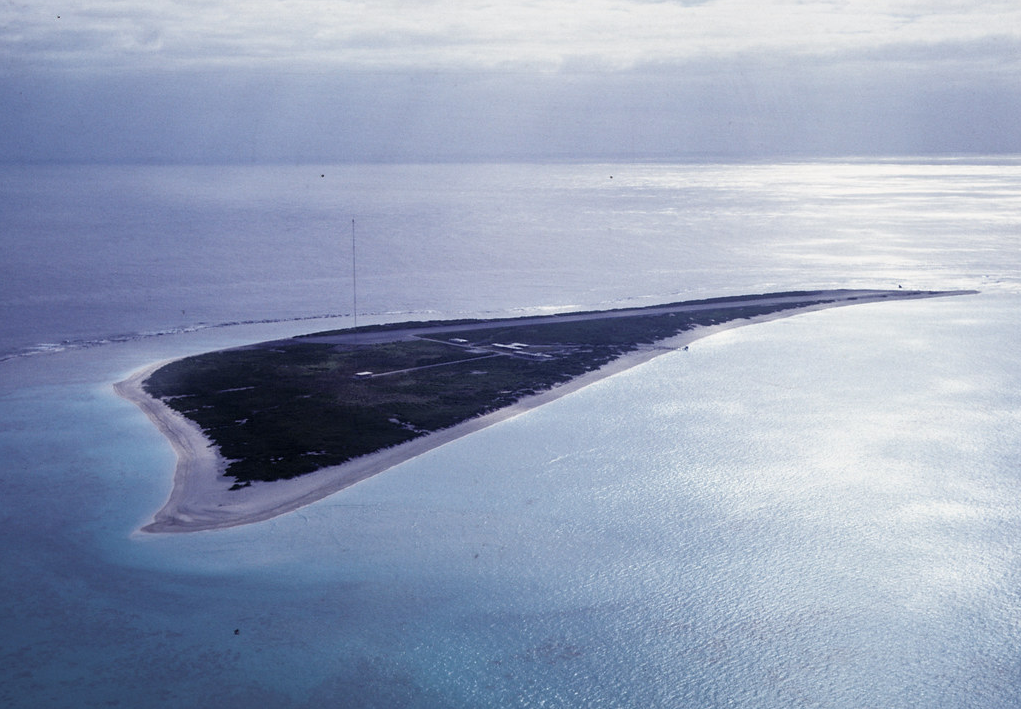
It is fifty-five miles from Kure to Midway and I flew those fifty-five miles, and when I was through Midway was not there. I had been wrong in my reckoning, fatally wrong. Half in hysteria I began to execute left hand turns, trying to figure where I was. There was no reason to it, but nothing had reason any more. The gas would soon run out. It was running out now. Soon the motor would sputter and stop.
I was in another of those wild left turns when I felt Huber kicking the rudder bar in a righthand direction. I didn’t want to look back at him, but I had to. Mutely and with feeble gestures he pointed to port, to what appeared to be nothing but a black cloud hanging over the water. It looked as if it might be a burning ship, but it would be a good idea to land close by. There would be life-boats down there. I headed toward the black smoke.
Just then a pair of Army Flying Fortresses swept by. I wanted to yell Hallelujah! That was the way I felt. I moved in behind them. They knew the way to Midway and in just a few minutes there it was!
Smoke was still columning up from it in several places. I spiraled down for a landing, when all at once I discovered that the shattered hydraulic system made it impossible to lower the wing flaps to break the speed when we approached the ground. I was getting ready to climb up again to lower the flaps with an emergency manual control, when Huber mumbled again.
Damn the flaps to hell!
We touched ground at high speed, bounced up into the air again, bounced down again, blew a tire, and after rolling a good distance we stopped. Field men dashed toward us, with a stretcher. Gently they lifted Huber from his seat. He was still conscious when they carried him away.
“Do you think he’s got a chance?” I asked one of the men standing by.
The man shrugged. “Maybe; maybe not.”
I was returning from the dressing station when I saw Jesse Rollow coming toward me. “Jesse,” I called out, “how many got back?”
He fell in beside me. “I don’t know, Tom,” he replied in a shocked, toneless voice. “I just got back myself.”
We lit cigarettes and stood watching the sky, waiting for friends to come home.

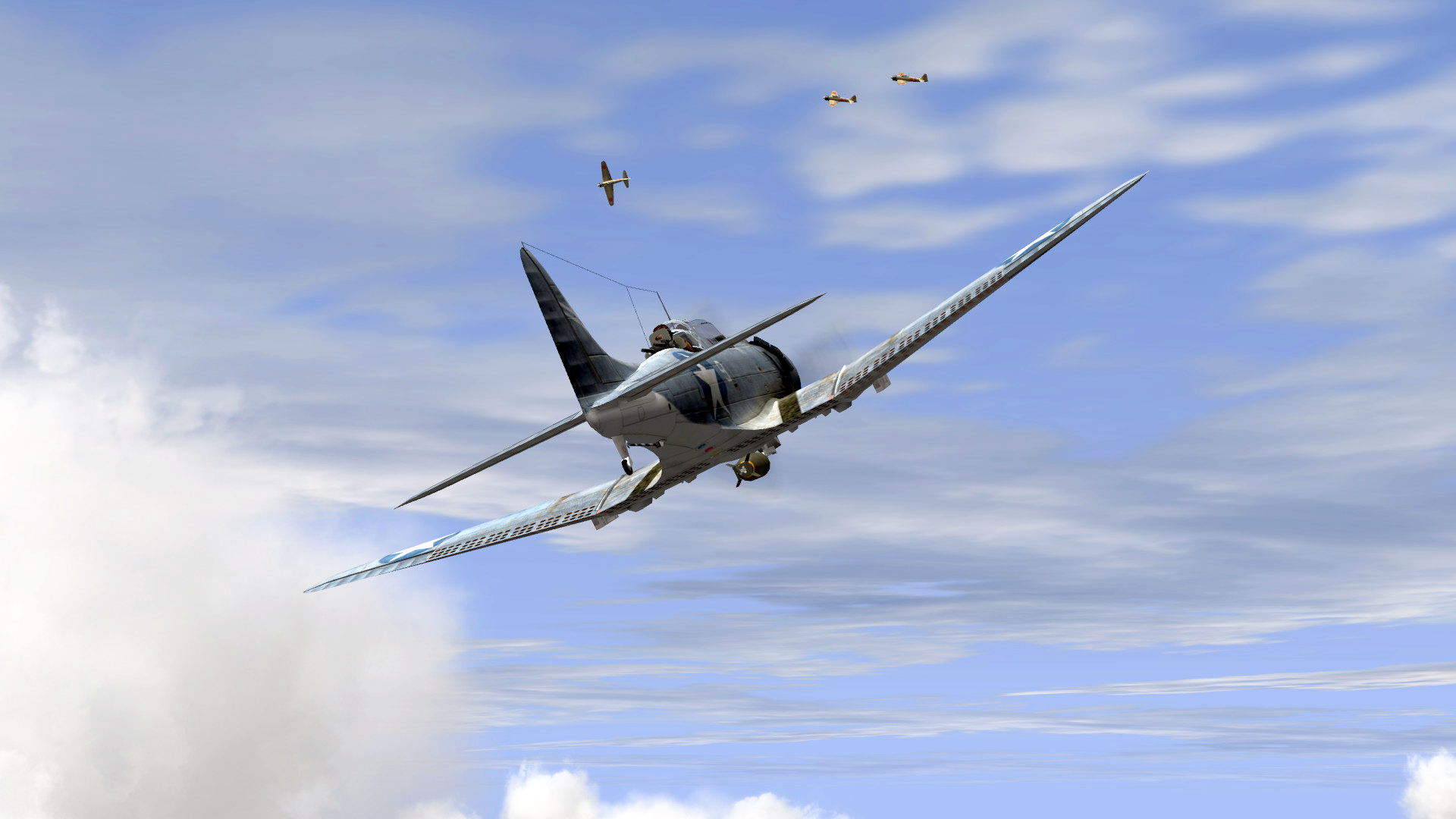








5
4.5